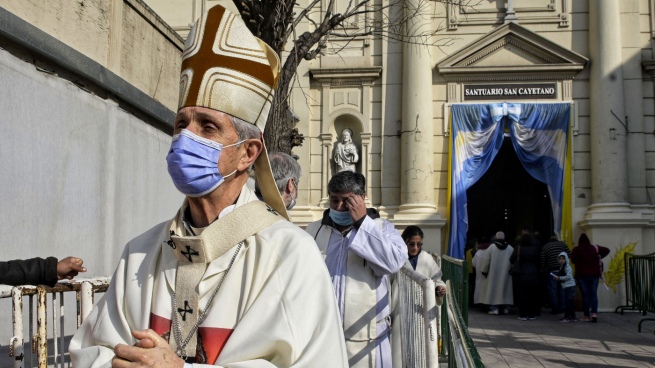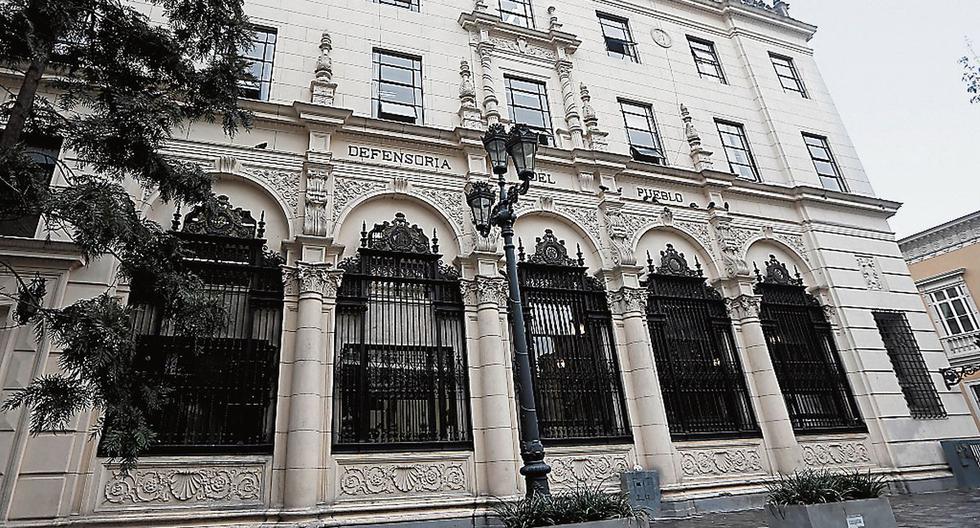The Archbishop of Buenos Aires, Mario Poli, He exhorted the parishioners to adopt “solidarity and fraternal attitudes that allow us to rebuild this Argentina that hurts us all”at the central mass that he presided over on Sunday morning as part of the celebration of San Cayetano.
Referring to the biblical passage known as “the good Samaritan” recounted in the day’s gospel, Poli asked the thousands of faithful who attend the central mass of the celebration of Saint Cajetan to let themselves be “challenged by the parable, capable of putting show the supportive and fraternal attitudes that allow us to rebuild this Argentina that hurts us all”.
Hundreds of people formed more than seven blocks in line on Sunday morning around the parish of San Cayetano, in Linierswhich after two years of pandemic reopened its doors to the congregation to celebrate the patron saint of bread and work on his day.
“Glorious San Cayetano, may we never lack bread and work in our house,” read a large poster placed in front of the temple at 150 Cuzco Street.
At 11 o’clock the Archbishop of Buenos Aires, Mario Poli, presided over the central mass.
The Cardinal Primate of Argentina began his preaching by assuring that “when the doors are closed” that people usually knock in search of satisfying their needs, “the doors of the sanctuary are opened” of San Cayetano, the patron saint of bread and work that “intercede before Jesus so that everyone receives the material and spiritual graces they need to continue walking”.
“If they have come this far, it is because they know very well that, when the doors that they have knocked on many times close, the doors of the sanctuary open and they meet Saint Cajetan, who intercedes before the Jesus he holds in his arms, so that everyone receive the material and spiritual graces they need to continue walking,” Poli said during the mass.
“The example of the Good Samaritan gives us a sympathetic look at reality, not to scandalize us, but to move us and commit us. Meanwhile, ‘we beg for daily bread’, as Jesus taught us. The bread that nourishes our life and that daily it becomes more unattainable because of the suffocating inflation that we suffer and that generates misery,” he continued.
“How can we not think about the growing number of brothers and sisters who come to the dining rooms on a daily basis, in the elderly who cannot buy their medicine, in families whose income is increasingly insignificant?” he continued.
In another section of his homily, Poli highlighted: “We have to thank heaven because there are many anonymous ‘Cayetanos’, men and women who do not pass by the pain of those who are on the roadside of life; they are the Samaritans of our days who share their time and their goods, and without measuring sacrifices renew in the social body the yearning for happiness that God has placed in the heart of every human being: the hope, the virtue that sustains in trials and makes us wait for times of encounter and peace among Argentines “, said.
Poli also indirectly referred to insecuritystating that the parable “tells an act of violence” that “never ceases to surprise us, because it resembles those that happen daily in our neighborhoods, and there are so many that we have already gotten used to it”.
The celebration
The so-called Fiesta Grande of the Liniers sanctuary has as its motto this year “Thank you San Cayetano for joining us, help us take care of ourselves as brothers”.
With the traditional chimes, after the Federal Police band played the national anthem, at 0 o’clock this Sunday, the priests opened the iron doors of the temple on Cuzco Street, which began the Catholic festivity that takes place simultaneously in several parishes across the country, after two years of pandemic in which the celebration could not be held for health reasons.
The devotees of the saint made this Sunday more than seven blocks in a row on the sidewalks near the sanctuary, where they were located with folding chairs, ponchos and thermoses with mate or coffee, around which groups of relatives, co-workers gathered. or even of faithful who are known to participate in previous editions.
In each block a priest of the church was ready to bless the parishioners who bring their ears of corn.
Néstor Suárez is 50 years old and is from Lanús. In his hands he carried a large printed image of San Cayetano. “I come every year to thank our patron saint. I always had a job and since I was a child I thank him for what he gives us,” said the man who admits that he always carries an image of the saint in his wallet.
Mirtha Vázquez, 63, from the Boedo neighborhood, said that she returned to this celebration after 10 years to ask for a job for her son.
“I come for my son who has been looking for a job for months but has no luck. I hope that the Lord will help him soon because we are desperate,” said the lady who wore a Saint Benedict medal.
A few meters, the priest Blas Giancarlo, after blessing a group of parishioners, pointed out: “Some come to thank them for having a job and others to ask, not only for themselves, but for a family member or friend. That’s something to appreciate, because it’s always easier to come for yourself.”
And he stressed: “This shows how people are in popular neighborhoods, who go out every day to look for work or earn their bread with dignity,” he emphasized.
On the corner of Bueras, one block from the church in the Liniers neighborhood, Alfredo Manrique sings popular Argentine songs accompanied by his guitar.
“This is a way of thanking the patron saint for what he does for us,” said Manrique.
The story of the Saint
The image of San Cayetano, native to Italy, arrived in the Liniers area in 1875 with the nuns of Divino Salvador, who founded a chapel and a school dedicated to the patron saint of Providence, after which the temple was built in 1900 and was consecrated parish in 1913.
Devotion to Saint Cajetan became popular after the 1930 crisis, when, faced with the desperation of the working sectors, the parish priest Domingo Falgioni organized a pastoral that promoted the veneration of the saint, who began to be that of “bread and work “.
The parish authorities announced that this Sunday there will be masses and blessings throughout the day.









